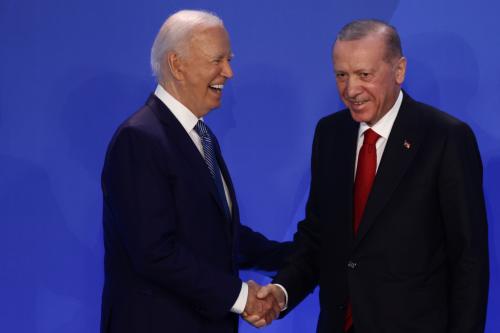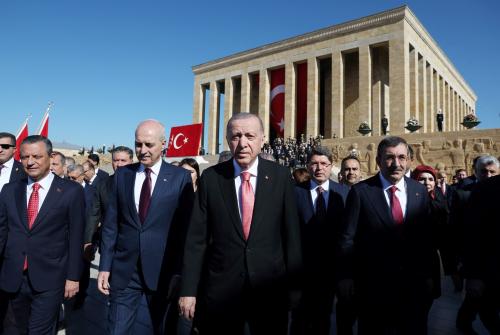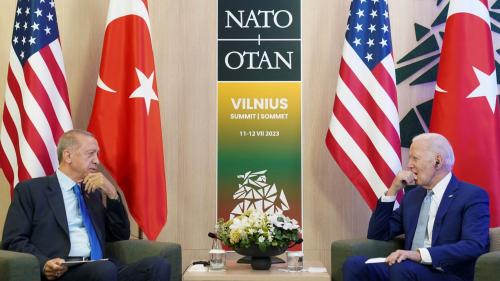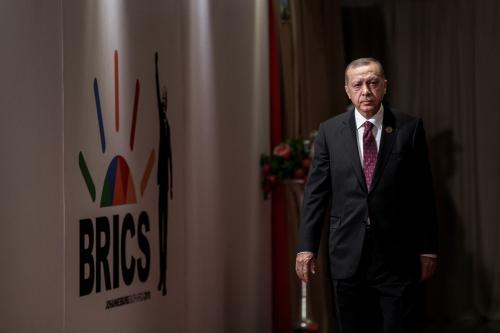Perhaps the most successful outcome of Turkey’s decades-long Western vocation has been the integration of its economy into the global trade and financial systems. Liberal market policies that were implemented starting in the early 1980s culminated in the establishment of a customs union for industrial goods with the European Union (EU) on December 31, 1995. The customs union boosted Turkey’s manufacturing sector, placing Turkey among the top 20 global exporters, when the EU is treated as a bloc, since then. It also aligned Turkey’s and the EU’s trade regulations, thereby strengthening Turkey’s economic competitiveness and its integration into the EU single market.
The global economic order is no longer marked by the kind of trade liberalization that has benefitted many middle-income countries like Turkey, presenting a major challenge for Turkey’s economic future. For instance, the United States, which is an important trading partner for Turkey, has become an unreliable and unpredictable player under President Donald Trump. In such an increasingly challenging world, both Turkey and the EU have an interest in deepening their economic relations.
An economy driven by trade
Contemporary Turkey is a trading country. Foreign trade comprised 55.2% of its overall GDP in 2023. This figure stands at around 50% for the EU, yet is a mere 18.7% for the United States. The EU is by far Turkey’s largest export market: totaling almost 96 billion euros (about $100 billion) in 2023 compared to less than $15 billion for China and Russia put together. Additionally, unlike in the cases of China and Russia, with whom Turkey runs huge trade deficits, its trade with the EU is much more balanced, suggesting a strong complementarity. In the absence of a free trade agreement, American-Turkish trade has grown at a much slower pace and is less diverse. Nevertheless, the United States has consistently been Turkey’s second-largest individual export market. As of November 2024, these exports stood at $16.4 billion within an overall annual trade volume of over $30 billion.
The EU has a stake in increasing its economic cooperation with Turkey. Turkey is the EU’s fifth-largest trade partner, behind Switzerland and ahead of Japan, with a record €206 billion (about $215 billion) of goods traded in 2023. Turkey’s and the EU’s industries are also closely integrated, which has become especially important at a time when the EU is interested in near-shoring to shorten and secure its supply lines. Furthermore, amid Europe’s declining competitive power, as flagged by the famous Draghi report, Turkey offers EU businesses easier access to Middle Eastern markets and beyond, including Africa. Ultimately, both sides would benefit from a rules-based trade and investment relationship in such volatile times.
Trump 2.0 and Turkey’s trade policy
Trump’s politicized approach to trade and tariffs has accelerated protectionism and fragmentation in the global trading system. Turkey has experienced its share of tariff hikes during Trump’s first term. Despite the so-called “bromance” between Trump and Turkish President Recep Tayyip Erdoğan, it was under the former’s first administration that Turkish-American trade was beset with tensions. Trump imposed 25% tariffs on iron and steel imports from Turkey in 2018 before doubling them to 50%. According to data from the U.S. International Trade Commission, the tariffs resulted in around a 23% drop in Turkish exports to the United States by 2023, bringing Turkey down from the 13th biggest iron and steel supplier to the United States in 2018 to the 19th in 2023. This triggered a mini-trade war when Turkey introduced retaliatory tariffs on a range of U.S. goods such as automobiles, nuts and spirits, rice, beauty products, and certain types of paper. These measures shaved off almost 49% of U.S. exports of these products to Turkey between 2018 and 2023.
The Trump administration’s decisions were purely political and stemmed from the detention of an American pastor in Turkey; they were clearly not driven by trade concerns. In response to Turkish military operations against Kurdish groups allied with the United States in northeastern Syria in 2019, the United States placed additional sanctions on Turkey, this time targeting Turkey’s defense and energy sectors, and threatened to destroy Turkey’s economy. The same year, Turkey was also excluded from the U.S. Generalized System of Preferences, which grants some developing countries preferential access to the U.S. market on selected goods. This resulted in a loss of market share of almost $2 billion worth of Turkish exports due to higher import duties.
Trump’s previous record coupled with an abundance of disagreements between the United States and Turkey, particularly with respect to the U.S. military presence in Syria as well as Israel’s military operations against Palestinians, make it unrealistic to assume that there will be smooth economic relations between the two sides. Already there are indications that Trump, under pressure from his allies in Congress, may impose additional sanctions on Turkey unless Erdoğan chooses a more cooperative foreign policy, especially in its relations with Israel.
Yet, Turkey may fall under the radar when it comes to Trump’s fixation on tariff hikes. Turkey’s trade with the United States is relatively balanced and small compared to Canada, China, the EU, and Mexico. Many Turks also expect that Erdoğan and Trump’s special rapport will lead to lower tariffs and an expansion of Turkish exports to the United States. However, this hope needs to be balanced by a healthy dose of realism shaped by Trump’s prior punishing economic policies toward Turkey and his disregard for the once U.S.-led rule-based trading order. Such realism dictates that Turkey should hedge its bets by deepening its economic relations and modernizing its customs union with the EU.
A transformed economic landscape
Since Trump’s first term, the global trading order has experienced further fragmentation, contrary to hopes of a return to rules-based global order post-Trump. Today, we see a more transactional scene at the global level where multilateral agreements such as those on trade, climate, or global health are weakening just as geopolitical tensions are rising and even provoking wars. Economic competition over new technologies such as those relating to green transformation or artificial intelligence is getting fiercer every day. The race to lead tomorrow’s global economy is resulting in growing competition over national trade and industrial policies. China, for instance, is implementing export controls on critical minerals that are central for much-needed electrification, and the United States is banning investments in and exports that go into sensitive technologies in China. Similarly, as it loses its competitive power, the EU is resorting to protective trade measures, such as those against Chinese electric vehicles, to improve its long-term economic prospects. Navigating these uncharted waters, therefore, presents additional challenges for developing economies. Against this backdrop and amid widespread concerns that trade wars are prone to produce zero-sum outcomes, there emerges a need for recalibration of Turkey’s trade policy.
Westward, one step at a time
Turkey could benefit from recalibrating its international trade policy. However, this will depend on its economic rationality, pragmatism, and flexibility. Despite all the hype about Ankara’s current political orientation away from the West, Turkey and Europe are mutually dependent in terms of their economic security and competitiveness. The customs union as a rules-based trading framework is the source of this mutual dependency.
However, the customs union needs to be modernized to cover services, agriculture, and improved dispute settlement. According to the World Bank and an impact study commissioned by the EU in 2016, such a modernization would significantly benefit both sides; in fact, a 2021 European Parliament study shows it could grow Turkish GDP by 1.84%. This would also boost foreign direct investment in Turkey as well as its technological base while enhancing the security of the EU’s supply lines. Turkey’s recent High Tech Investment Program (HIT-30), for example, which envisions investment incentives of around $30 billion in areas such as new generation vehicles, battery and chip technologies, solar panels, and wind turbines, could constitute a timely development to achieve these goals.
The European Commission proposed to modernize the customs union in 2016; however, rising authoritarianism in Turkey and deteriorating Turkish-EU relations culminated in a 2018 announcement by the European Council that “no further work towards the modernisation of the EU-Turkey Customs Union is foreseen.” Yet, more recently, a host of factors including competitive Turkish elections, the abandonment of unorthodox economic policies, the adoption of a more pragmatic foreign policy, and various geopolitical and supply chain-related issues have rekindled an interest in modernizing the customs union. For example, in November 2023, the European Community-Turkey Association Council, the body critical to decisions related to the customs union, resumed its activities. Also, after a long break, a high-level dialogue on trade and modernizing the customs union took place in July 2024.
Notwithstanding a host of challenges and disputes in the way of modernizing the customs union, including a need for Turkey to improve its commitment to democracy and the rule of law, this positive climate has created space for hope. The EU and Turkey have a mutual interest in boosting their economic integration and given Trump’s unpredictability, Erdoğan should invest in a proven and predictable economic relationship with the EU. Such a preference centered around trading via rules would serve both the Turkish and the EU economies by locking in prosperity over the long run.
The Brookings Institution is committed to quality, independence, and impact.
We are supported by a diverse array of funders. In line with our values and policies, each Brookings publication represents the sole views of its author(s).









Commentary
In the era of Trump tariffs, Turkey should look to the European Union
The global economic order is no longer marked by the kind of trade liberalization that has benefitted many middle-income countries, presenting a major challenge for Turkey’s economic future.
February 19, 2025